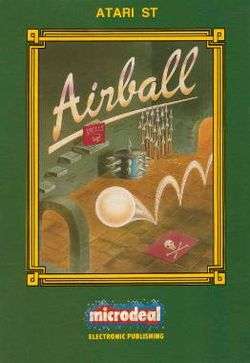Airball (video game)
| Airball | |
|---|---|
 Cover Art | |
| Developer(s) | Microdeal |
| Publisher(s) | Microdeal |
| Designer(s) | Ed Scio |
| Platform(s) | Dragon 32/64, TRS-80 Color Computer, Atari ST, Amiga, Apple IIgs, MS-DOS, Atari 8-bit, Game Boy Advance |
| Release | 1987 |
| Genre(s) | Puzzle |
Airball is a videogame released in 1987 by MichTron/Microdeal. The game was programmed by Ed Scio, graphics by Pete Lyon, music by Paul Shields, and level design by Pete Scott. Pete Lyon was the main artist for Microdeal games in the late 1980s, such as Goldrunner and Tanglewood..
The game was originally released for the Dragon 32/64 and TRS-80 Colour Computer, with ports following for the Atari ST, Amiga, MS-DOS, Atari 8-bit, and Game Boy Advance. Airball was also ported to the Apple IIgs, but saw an extremely limited run with fewer than 150 sales for the platform. A version for the NES was under development, but cancelled; however, several partially complete prototype cartridges are circulating. Reproduction carts have been made available from RetroZone.
Gameplay
.png)
The player begins every round atop inflating stations. These inflating stations, which are scattered throughout the arenas, also act as checkpoints. Remaining atop an inflating station for too long will cause the player to burst. A bar gauge at the bottom of the screen allows the player to monitor their air level.
Navigating the levels is accomplished with the directional buttons and a jump button. The view is isometric, which can often make complicated movements (such as jumping across gaps or weaving through obstacles) difficult.
Points are gathered in the form of gems that appear randomly in rooms. Players pass through the gems for collection.
Airball can ascend stairs by jumping. The surrounding spikes, one of many obstacles found in the game, cause the player to burst. The yellow bar is the amount of air left in the ball, and the three balls in the lower left of the screen indicate the remaining lives. The isometric projection is very visible in this image.